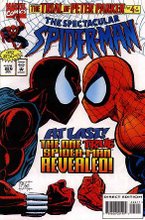Lest it seem that I have nothing but disdain for Marvel's Civil War crossover event, I have decided to list here what I thought they did well, and what I hope to see more of in the future.
The Return of Captain Marvel
I thought this was really cool. Considering the fact that it was Nitro of all people that kicks off the show in Civil War #1, there's a neat bit of symmetry when Captain Marvel turns up unexpectedly. Bringing this character back was a smart move. He's fairly popular, and the setup is perfect. He's already been exposed to the cancer-causing gas. He's a dead man walking and he knows it. His wife has already mourned him, and he's surrounded by familiar people who he doesn't know.
There's so much pathos there it makes me want to cry. Whatever writer gets to play with Mar-Vell is in for a treat. There's some great material there.
The Fifty-State Initiative
This is cool on many levels. Sure at first glance it's silly, 'cause freaking Idaho doesn't have supervillain issues like New York does, why does it need a team?
But when you think about it, it opens the door for a lot of great storytelling. Wherever a chase or investigation leads you, you'll have a handful of supporting characters for backup. And in the hands of a good writer, even a team of c-listers can be fun. Just look at Squirrel Girl and the Great Lakes Avengers.
Also, imagine the potential for conflict when people get touchy about jurisdiction. "Sorry, you can't chase that supervillain into Texas. He's Ranger business now. Go on home." There's even room for fish out of water stories. Imagine a hero from LA suddenly assigned to Kansas or North Dakota. Just picture Nighthawk cropdusting.
Captain America's Death
This one is a qualified like. His death was very well handled and respectful. It is having a significant effect on the Marvel Universe, and actually sparked human emotion from
The Art
Civil War is gorgeous. Honestly it is. Steve McNiven is good. The level of detail is nice too. A lot of symbolism thrown around, lots of torn masks and whatnot. The proportions and posing of the characters is highly realistic, which only heightens the feeling of immediacy that Marvel strove for in these books. They are trying to make their universe of flying men, mutants and magic seem more like our own, and art like this is a good way of doing it. The tie-in titles are fairly standard fare for their respective creators, but I didn't see anything glaringly bad. She-Hulk has great art as always, and I have to give them bonus points for actually depicting Shulkie as a full-figured woman, rather than yet another perfect hourglass figure. She has mass and bulk, and she should.
France
Fantastic Four # 541 was one of the best comics I've read in a long time. I laughed on almost every page, but at the same time, the humor was tempered by the knowledge of what Ben Grimm was running away from. His longing for a simpler time was one I understood completely.
Aunt May getting Shot
Not to be bloodthirsty or anything, but kill the old bat already. She's dead weight on the Spider-titles, and I really don't want to see another story arc about her and Jarvis hooking up. And really, if she lives through this, it's only a matter of time till Doc Ock comes for revenge and gets himself a MAX book.
Garth Ennis: I always wanted to do the Marvel version of Overfiend.
The Punisher in a mainstream book
He is not a Quentin Tarantino character, Marvel. He doesn't need to be hyperviolent 24/7 to sell comics. He's a Rambo style anti-hero. Write him like it. He's a trained military man, who has useful skills if you can just convince him to not shoot people. (This is hard to do.)
There were a lot more moments that I liked, such as Sue Richards stopping Tony from drinking, and Cap decking Punisher, but they are small against the bigger picture. Till next time, keep reading comics!
-Exar
Next: the plot hole so big, it tunneled straight to hell.


